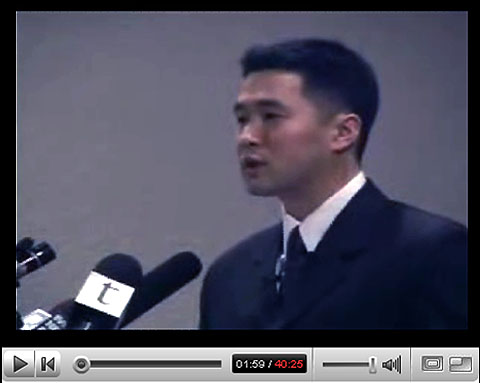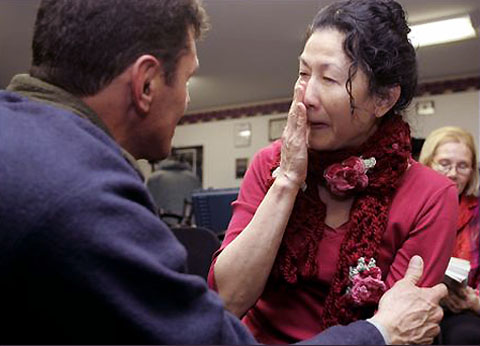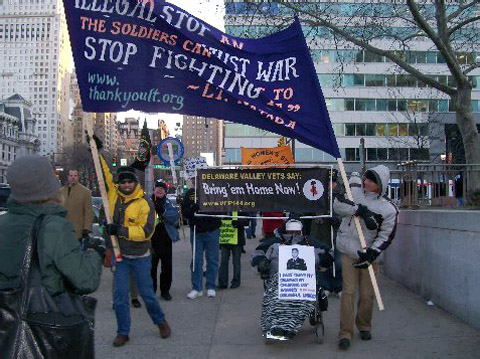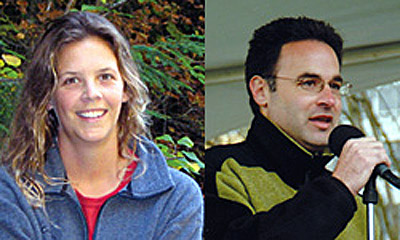SOURCE: CAROL BAIN bain@kauai.net
POSTED: 20
FEBRUARY 2007 - 8:30pm HST

by Carol Bain on 20 February 2007 The subject of the talk was "Citizen Responsibility" and was given just a few days before Lt. Watada was brought to court martial and it was determined that the prosecution had created mistrail. The video is forty minutes long. The specific YouTube.com url is: |
SOURCE: KEN TAYLOR taylork021@hawaii.rr.com
POSTED: 8 FEBRUARY 2007 - 7:30am HST
Mistrial could be end of Watada case

Carolyn Ho, mother of Ehren Watada, sheds a tear. In background Ann Wright, a retired Army colonel
by Mike Barber on 8 February 2007 in The Seattle Post-Intelligencer
see also:
Island Breath: Court Martial to start 12/20/2006 Island Breath: Watada Explains Island Breath: Support Lt Watada1
|
SOURCE: JUAN WILSON juanwilson@mac.com
POSTED: 7 FEBRUARY 2007 - 3:00pm HST
Mistrial ends Watada court-martial... for now

100 Watada supporters brave zero degree cold while Lt Watada takes the heat
| by Mike Barber on 7 February 2007 in The Seattle Post-Intelligencer The court-martial of 1st Lt. Ehren Watada ended in a mistrial Wednesday in Fort Lewis, Washington. The case's judge, Lt. Col. John Head, declared the trial over after a day of wrangling over a stipulation of facts that Watada had signed before the trial and that would have been part of the instructions to the jury. The judge decided that Watada never intended when he signed the stipulation to mean that he had a duty to go to Iraq with his unit. Again the issue was Watada's views on the Iraq war -- opinions that kept him from going with his unit to the conflict and that the judge didn't want brought up at the court-martial. Watada, a Stryker Brigade soldier, is the first commissioned officer to refuse to be deployed to Iraq. Watada's unit left this sprawling base for Iraq in June, but Watada remained behind. He said he believes the war is illegal and that his duty is to not abide by illegal orders. But Head tried to keep the court-martial from becoming a tribunal on the war and its legality and has ruled that Watada's attorney cannot present witnesses to question the war's legality. Outside the base, that has been the issue as peace activists from across the country have rallied to Watada's side. Watada is charged with missing movement to Iraq and with two counts of conduct unbecoming an officer. Those last two charges result from statements Watada made against the war in a video tape released to reporters after he made his refusal to go to Iraq public and to a Veterans for Peace convention at the University of Washington. He had been charged with two other counts of conduct unbecoming for interviews he gave. Prosecutors dropped those charged in return for Watada's signing a stipulation that he had given the interviews. He also acknowledged in the stipulation that he didn't go with his unit to Iraq, though he didn't admit his guilt to the missing movement charge. With the jury of officers out of the courtroom Wednesday morning, Head wanted to question Watada about the stipulation to make sure that it was accurate and to protect the lieutenant against any mistakes in it. But Eric Seitz, Watada's attorney, objected to the questioning. He said the stipulation should include Watada's reasons for not going to Iraq: His views that the war is illegal. "It has always been his position that not only would he miss movement but he would not participate in a war he considered illegal" and not participate in war crimes, Seitz said. "His specific intent was of a different character all together" than simply missing his unit's deployment to Iraq, Seitz said. To prove a charge of missing movement, the prosecutors need to show that Watada did not report when he had a duty to do so. The disagreement that prompted the mistrial was about whether Watada admitted missing troop movement and having a duty to report, or only missing troop movement. "I see there is an inconsistency in the stipulation of fact," the judge said Wednesday. "I don't know how I can accept (it) as we stand here now." Because much of the Army's evidence was laid out in the document, rejecting it would hurt its case, Head acknowledged. |
SOURCE: KEN TAYLOR taylork021@hawaii.rr.com
POSTED: 5 JANUARY 2007 - 11:30am HST
Military subpoenas reporters in Watada case

anti-war reporters Sarah Olsen and Dahr Jamai have been subpoened by military
by Jeff Paterson on 4 January 2007 in www.CourageToResist.org In the face of growing attention, judge delays testimony until February 5. Democracy Now! Interview: U.S. Army Tries to Force Suzanne Swift is released from brig |
See other KITV articles about Watada:
July 27, 2006: Groups Show Support For Soldier Who Refused Deployment
July 13, 2006: Hearing Set For Soldier Who Refused Iraq Deployment
July 6, 2006: Army Charges Soldier Who Refused To Deploy
June 26, 2006: Hawaii Soldier Who Refused Deployment Is Reassigned
June 23, 2006: Hawaii Soldier Refuses To Leave With Unit For Iraq
June 8, 2006: Soldier Receives Death Threats Over Refusal To Go To Iraq
June 8, 2006: Soldier Ready To Face Jail For Refusing Deployment
June 7, 2006: Hawaii Soldier Refuses To Deploy To Iraq